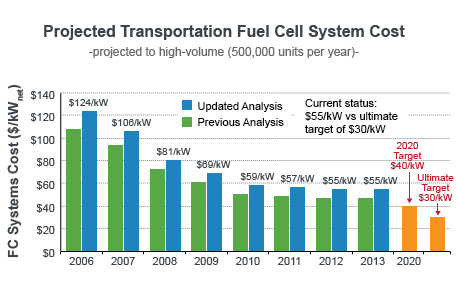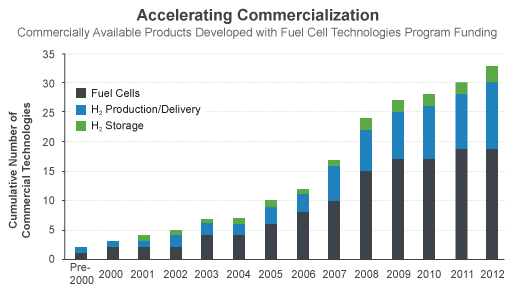Welcome to DU!
The truly grassroots left-of-center political community where regular people, not algorithms, drive the discussions and set the standards.
Join the community:
Create a free account
Support DU (and get rid of ads!):
Become a Star Member
Latest Breaking News
General Discussion
The DU Lounge
All Forums
Issue Forums
Culture Forums
Alliance Forums
Region Forums
Support Forums
Help & Search
Environment & Energy
Related: About this forumBreakthrough in hydrogen fuel production (from plants) could revolutionize alternative energy market
http://www.vtnews.vt.edu/articles/2013/04/040413-cals-hydrogen.html[font face=Serif][font size=5]Breakthrough in hydrogen fuel production could revolutionize alternative energy market[/font]
[font size=3]BLACKSBURG, Va., April 4, 2013 – A team of Virginia Tech researchers has discovered a way to extract large quantities of hydrogen from any plant, a breakthrough that has the potential to bring a low-cost, environmentally friendly fuel source to the world.
“Our new process could help end our dependence on fossil fuels,” said Y.H. Percival Zhang, an associate professor of biological systems engineering in the College of Agriculture and Life Sciences and the College of Engineering. “Hydrogen is one of the most important biofuels of the future.”
Zhang and his team have succeeded in using xylose, the most abundant simple plant sugar, to produce a large quantity of hydrogen that previously was attainable only in theory. Zhang’s method can be performed using any source of biomass.
…
This new environmentally friendly method of producing hydrogen utilizes renewable natural resources, releases almost no greenhouse gasses, and does not require costly or heavy metals. Previous methods to produce hydrogen are expensive and create greenhouse gases.
…[/font][/font]
http://dx.doi.org/10.1002/anie.201300766[font size=3]BLACKSBURG, Va., April 4, 2013 – A team of Virginia Tech researchers has discovered a way to extract large quantities of hydrogen from any plant, a breakthrough that has the potential to bring a low-cost, environmentally friendly fuel source to the world.
“Our new process could help end our dependence on fossil fuels,” said Y.H. Percival Zhang, an associate professor of biological systems engineering in the College of Agriculture and Life Sciences and the College of Engineering. “Hydrogen is one of the most important biofuels of the future.”
Zhang and his team have succeeded in using xylose, the most abundant simple plant sugar, to produce a large quantity of hydrogen that previously was attainable only in theory. Zhang’s method can be performed using any source of biomass.
…
This new environmentally friendly method of producing hydrogen utilizes renewable natural resources, releases almost no greenhouse gasses, and does not require costly or heavy metals. Previous methods to produce hydrogen are expensive and create greenhouse gases.
…[/font][/font]
InfoView thread info, including edit history
TrashPut this thread in your Trash Can (My DU » Trash Can)
BookmarkAdd this thread to your Bookmarks (My DU » Bookmarks)
4 replies, 3408 views
ShareGet links to this post and/or share on social media
AlertAlert this post for a rule violation
PowersThere are no powers you can use on this post
EditCannot edit other people's posts
ReplyReply to this post
EditCannot edit other people's posts
Rec (3)
ReplyReply to this post
4 replies
 = new reply since forum marked as read
Highlight:
NoneDon't highlight anything
5 newestHighlight 5 most recent replies
= new reply since forum marked as read
Highlight:
NoneDon't highlight anything
5 newestHighlight 5 most recent replies
Breakthrough in hydrogen fuel production (from plants) could revolutionize alternative energy market (Original Post)
OKIsItJustMe
Apr 2013
OP
angry citizen
(73 posts)1. whatch out for the oil men
Do you expect the petrolium industy to rool over and let thid happen?
OKIsItJustMe
(19,937 posts)2. Umů
The “oil men” could run facilities to do the processing. (There’s money to be made here.)
cprise
(8,445 posts)3. The main problems with hydrogen AFAIK
...are in storing it and using it in fuel cells (which are expensive because they lack durability).
OKIsItJustMe
(19,937 posts)4. Not so much
(Please note, US Department of Energy information. — Copyright concerns are nil.)
http://www1.eere.energy.gov/hydrogenandfuelcells/accomplishments.html
[font face=Serif][font size=5]Accomplishments and Progress[/font]
[font size=3]The U.S. Department of Energy's (DOE's) efforts have greatly advanced the state of the art of hydrogen and fuel cell technologies—making significant progress toward overcoming many of the key challenges to widespread commercialization. DOE has also made major advances by demonstrating and validating the technologies under real-world conditions, supporting early markets through Recovery Act deployments, and leveraging domestic and international partnerships to advance the pace of commercialization. See the Fuel Cell Technologies Office's accomplishments fact sheet.[/font]
[font size=4]Reducing the Cost and Improving the Durability and Performance of Fuel Cells[/font]

[font size=3]Reduced the cost of automotive fuel cells by more than 35% since 2008 and more than 80% since 2002 (from $275/kW in 2002 to $47/kW in 2012, based on projections to high-volume manufacturing).[small]1[/small]
These cost reductions reflect numerous individual advances in key areas, including the development of durable membrane electrode assemblies (MEAs) with low platinum group metal (PGM) content.[small]2[/small]
Demonstrated more than 2,500-hour (75,000 miles) durability of fuel cell systems in vehicles operating under real-world conditions, with less than 10% degradation. This is more than double the maximum durability of 950 hours demonstrated in 2006.[small]3[/small]
Improved the performance of stationary fuel cells, including development of a solid-oxide fuel cell for micro-combined heat and power applications with an almost 25% increase in system power density, which has enabled a more than 30% reduction in stack volume and a 15% reduction in stack weight.[small]4[/small]
Developed advanced manufacturing methods and materials that enabled a 50% decrease in the cost of gas diffusion layers since 2008.[small]5[/small]
[font size=4]Improving Technologies for Producing, Delivering, and Storing Hydrogen[/font]

Reduced the cost of producing hydrogen from natural gas. Projected costs of hydrogen (assuming high-volume production and widespread deployment) have been reduced to approximately <$2.00/gallon gasoline equivalent (gge) produced (<~$4.00/gge produced, delivered and dispensed), for a wide range of natural gas prices—a cost that is competitive with gasoline.[small]6[/small]
Reduced the cost of producing hydrogen from renewable resources. Costs have been reduced for several pathways, including water electrolysis using wind energy and reforming of bio-derived liquids.[small]7[/small] Key examples of advances include: reducing the cost of electrolyzer stacks by more than 80% since 2002[small]8,9[/small] and improving the photosynthetic conversion of sunlight in hydrogen-producing microalgal cultures from 3% to 25%.[small]10[/small]
Reduced the cost of delivering hydrogen to the end-user. In the last few years, projected costs have been reduced by 40% for tube-trailer delivery of high-pressure gas, 20% for pipeline delivery of high-pressure gas, and 15% for tanker truck delivery of liquid hydrogen.[small]11[/small]
Improved the capacity of hydrogen storage systems. DOE has developed a novel "cryo-compressed" tank concept for hydrogen storage and made improvements that increased the gravimetric and volumetric capacity of these systems by approximately 50% since 2007.[small]12[/small] DOE's three hydrogen storage materials centers of excellence produced more than 400 potential materials for hydrogen storage—leveraging the efforts of multiple university, industry, and national lab partners. Among the key accomplishments in materials-based hydrogen storage are the identification and characterization of new materials with more than 50% improvement in capacity since 2004 and the improvement of kinetics for specific metal hydride materials by a factor of more than 60.[small]13[/small] The properties of the hydrogen storage materials examined have been incorporated in a publicly accessible, searchable database that was accessed by visitors from 55 countries in its first four months available.
…[/font]
[font size=3]The U.S. Department of Energy's (DOE's) efforts have greatly advanced the state of the art of hydrogen and fuel cell technologies—making significant progress toward overcoming many of the key challenges to widespread commercialization. DOE has also made major advances by demonstrating and validating the technologies under real-world conditions, supporting early markets through Recovery Act deployments, and leveraging domestic and international partnerships to advance the pace of commercialization. See the Fuel Cell Technologies Office's accomplishments fact sheet.[/font]
[font size=4]Reducing the Cost and Improving the Durability and Performance of Fuel Cells[/font]

[font size=3]Reduced the cost of automotive fuel cells by more than 35% since 2008 and more than 80% since 2002 (from $275/kW in 2002 to $47/kW in 2012, based on projections to high-volume manufacturing).[small]1[/small]
These cost reductions reflect numerous individual advances in key areas, including the development of durable membrane electrode assemblies (MEAs) with low platinum group metal (PGM) content.[small]2[/small]
Demonstrated more than 2,500-hour (75,000 miles) durability of fuel cell systems in vehicles operating under real-world conditions, with less than 10% degradation. This is more than double the maximum durability of 950 hours demonstrated in 2006.[small]3[/small]
Improved the performance of stationary fuel cells, including development of a solid-oxide fuel cell for micro-combined heat and power applications with an almost 25% increase in system power density, which has enabled a more than 30% reduction in stack volume and a 15% reduction in stack weight.[small]4[/small]
Developed advanced manufacturing methods and materials that enabled a 50% decrease in the cost of gas diffusion layers since 2008.[small]5[/small]
[font size=4]Improving Technologies for Producing, Delivering, and Storing Hydrogen[/font]

Reduced the cost of producing hydrogen from natural gas. Projected costs of hydrogen (assuming high-volume production and widespread deployment) have been reduced to approximately <$2.00/gallon gasoline equivalent (gge) produced (<~$4.00/gge produced, delivered and dispensed), for a wide range of natural gas prices—a cost that is competitive with gasoline.[small]6[/small]
Reduced the cost of producing hydrogen from renewable resources. Costs have been reduced for several pathways, including water electrolysis using wind energy and reforming of bio-derived liquids.[small]7[/small] Key examples of advances include: reducing the cost of electrolyzer stacks by more than 80% since 2002[small]8,9[/small] and improving the photosynthetic conversion of sunlight in hydrogen-producing microalgal cultures from 3% to 25%.[small]10[/small]
Reduced the cost of delivering hydrogen to the end-user. In the last few years, projected costs have been reduced by 40% for tube-trailer delivery of high-pressure gas, 20% for pipeline delivery of high-pressure gas, and 15% for tanker truck delivery of liquid hydrogen.[small]11[/small]
Improved the capacity of hydrogen storage systems. DOE has developed a novel "cryo-compressed" tank concept for hydrogen storage and made improvements that increased the gravimetric and volumetric capacity of these systems by approximately 50% since 2007.[small]12[/small] DOE's three hydrogen storage materials centers of excellence produced more than 400 potential materials for hydrogen storage—leveraging the efforts of multiple university, industry, and national lab partners. Among the key accomplishments in materials-based hydrogen storage are the identification and characterization of new materials with more than 50% improvement in capacity since 2004 and the improvement of kinetics for specific metal hydride materials by a factor of more than 60.[small]13[/small] The properties of the hydrogen storage materials examined have been incorporated in a publicly accessible, searchable database that was accessed by visitors from 55 countries in its first four months available.
…[/font]